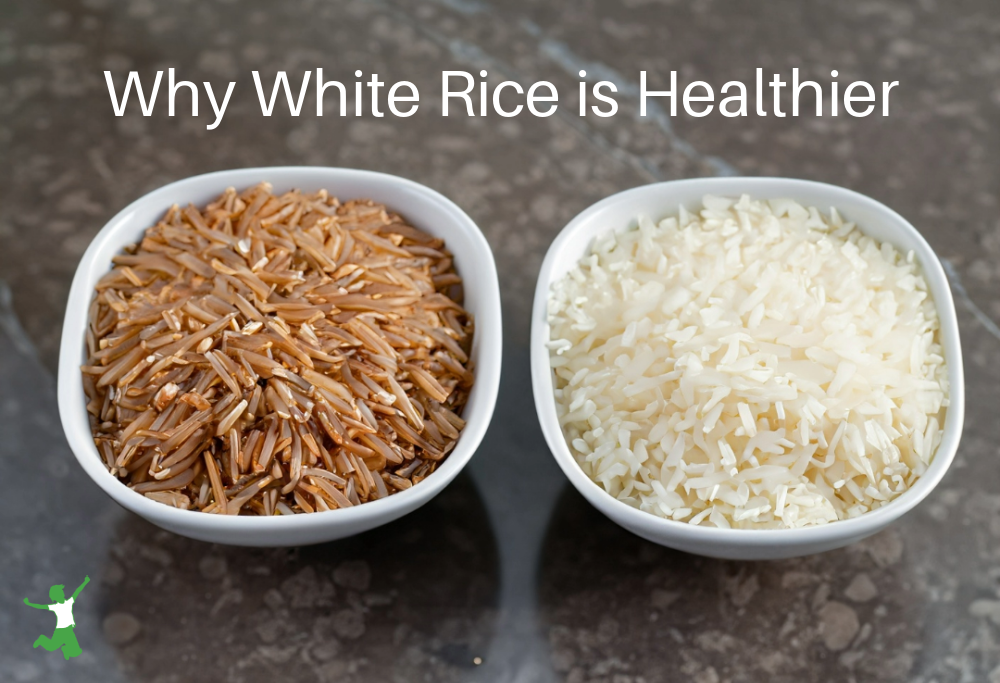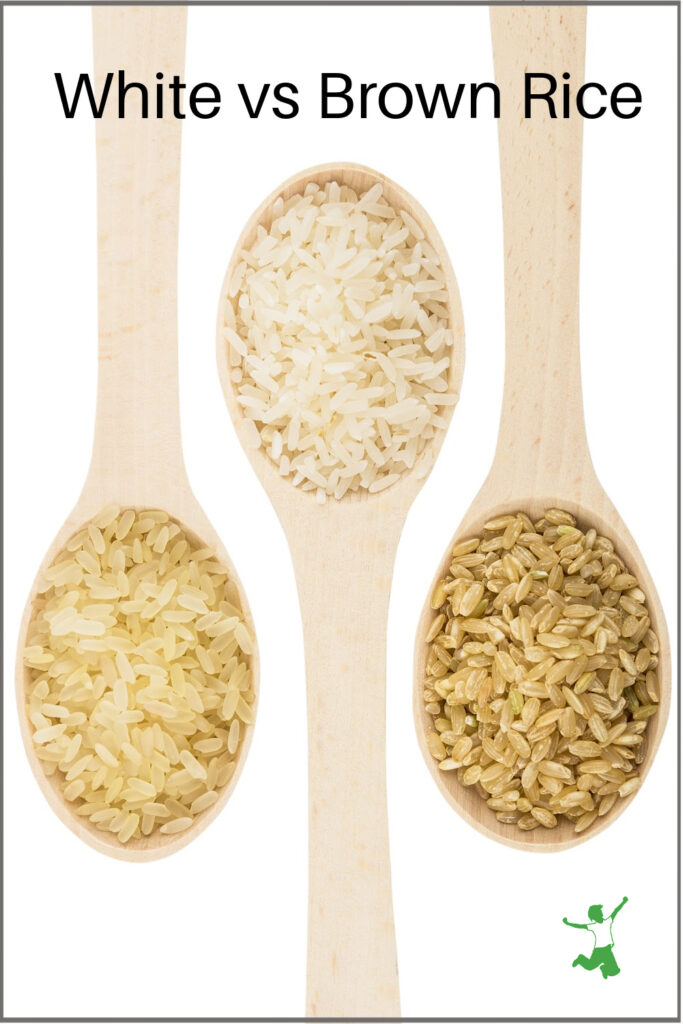The reasons white rice is healthier than brown rice as determined by research as well as which type traditional societies preferred consuming.

My article and video on healthy Chinese food drew some comments from readers who questioned my choice of rice.
Why was I using white rice vs brown? Isn’t brown rice the healthier choice, after all?
Ok, I’ll spill the beans, rice. Here are my reasons …
The truth is, neither my husband nor myself have ever enjoyed brown rice (although we love the nutty flavor and digestibility of wild rice).
Every time we eat brown, it just seems to not sit very well in our stomachs.
Even when it is sprouted or soaked before cooking, it, well, uh, sits like a brick for lack of a better word.
Why Some People Should Eat White Rice
White rice just seems to digest a whole lot better for us. That to me was reason enough to choose it over the brown rice.
We were also advised by an Ayurvedic MD back in the 1990s to stick with white basmati rice. This recommendation clinched the decision.
You are what you digest, after all – not necessarily what you eat!
End of story? Well, not quite.
Rice Fiber in Brown Harms a Compromised Gut
A few years back at the annual Wise Traditions Conference, I became familiar with a compelling book called Fiber Menace.
The author writes extensively about the dangers of a high-fiber diet as it pertains to a menu loaded with whole grains as pushed by the misguided Food Pyramid.
In other words, folks who eat a bowl of All Bran every morning to keep the bathroom visits regular are unknowingly ripping their insides to shreds.
The basic premise of Fiber Menace is that grain fiber plays a leading role in many gut-related ailments including colon cancer.
When I first learned of this information, my preference for white rice over brown rice started to make more sense.
Perhaps the brown rice didn’t digest that well because of all that fiber?
Chalk one up for the white rice.
White Rice Far Lower in Phytic Acid
A second piece of information came from author Ramiel Nagel.
In his book, Cure Tooth Decay, he writes about the devastating effects of phytic acid in the diet. Phytic acid is a very powerful antinutrient and blocker of mineral absorption in the gut.
Mr. Nagel identifies brown rice as very high in phytic acid.
What’s more, soaking brown rice does not reduce phytic acid by much at all!
Polished Rice is the Ancestral Form
Ramiel also maintains that the traditional method for preparing brown rice is never to eat it whole (with only the husk removed).
Rather, ancestral societies pounded brown rice in a mortar and pestle to polish it by removing the outer bran layer. This is the primary source of the phytic acid.
Nagel goes on to point out that experiments have shown that the milled and polished rice that results from this pounding process, has the highest mineral absorption.
In short, mineral absorption from whole brown rice is much less than white polished rice. This is because the phytic acid in the bran which is not reduced much by soaking, greatly interferes with the absorption process.
What About Arsenic?
A big issue with arsenic contamination in rice has emerged in recent years. Some folks have responded by no longer eating rice at all.
This is an overreaction, in my view.
Clean rice is definitely available if you know what to look for.
This article on how to avoid arsenic in rice details what to do. While soaking brown rice barely moves the needle on phytic acid, soaking white rice before cooking removes nearly all the arsenic!
Another option is to parboil white rice before using fresh water for a full cook if you don’t have time to soak.
Is White Rice Better Than Brown?
So it seems that brown rice is not necessarily a healthier choice than milled white rice.
Black or red rice would fall into the same category.
Obviously, whether you choose one or the other is a personal preference, but I hope this information helps you sort through the decision with a bit more clarity.
As for me and my family, we will be sticking with white basmati and jasmine rice (white basmati rice is more nutritious than plain white rice).
I currently buy this brand of rice in 25-pound bags as the most economical and high-quality choice.
Observation clued me in many years ago that brown rice was not something that was sitting well in my stomach or my husband’s.
As the years go by, more research is coming forth to indicate that this decision was the right way to go after all.
Do you eat white rice or brown rice in your home? Why or why not?

References
(1) Fiber Menace
(2) Living with Phytic Acid
More Information
Macrobiotic Diet and Extreme Vitamin D Deficiency
Tiny Teff Grains Deliver Big on Nutrition
How to Make Perfect Yellow Rice (Arroz Amarillo)
Millet: Healthy or Not?
Do Whole Grains Cause Cavities?








This is interesting to read! The doctor I am currently taking my daughter to has told me to only give her organic white basmati rice. I was surprised by that at first. At that time I thought only brown rice was the healthiest. I have found now that she digests the white basmati much better and it causes her no side effects the way the brown rice did.
I am very glad to see this article! My husband and I both grew up in a culture where white rice is a staple. I cook white rice at least once a day. We usually use it as a base for our meal, with other foods – meats, veggies – over it. Am dealing with digestive issues, as well as weight issues, and was about to try giving up rice entirely until I read your article. I’ve always been in the same camp that, if other cultures eat it and are healthy, why is it unhealthy for me? Thank you for agreeing with me!
I am going to try to cut down on the amount we eat, just to see if it helps with any of the issues I have, but at least I don’t have to feel guilty over our favorite food!
Hi Sarah ,
I too tried brown rice a few years ago.But had severe bloating and somehow my body didnt like it.So didnt try again.I am from India and we traditionally eat while short grain rice and also have basmati .
One question which is have is , should the white rice also be soaked before using ? Please explain
And also i suffer from lot if cavities , so i thinking of avoiding all grains and just add white rice a little whenever i feel low in energy.Will that work ?
I gave up brown rice last year as well. Just figured it had become too processed like many other foods. What do you know about the Himalayan red rice? I am eating that now with sauteed veggies. But usually I use quinoa. Sometimes buckwheat.
It’s funny I came upon your article! We buy white basmati in bulk and just recently I was thinking we should switch to brown because it is ‘healthier’ 🙂 My husband never really liked it, though I do. Can’t blame him! Maybe we’ll just stick to the basmati
this is a great post which sums up my views about rice!
and I started to look at foods also, not in terms of their macronutrients, but their energy, and I know you said you love science so this might not be your thing, but I think food is so much more than just ratios and numbers. anyway according to traditional chinese medicine and ayurveda, white rice is very neutral and healing for the body, whereas brown rice is nourishing but warming and drying at the same time, so not suited for frequent consumption. I think it’s that, the idea of balance, that really allows us to absorb all we can from our food. so that said, i do have wholegrain rice once in a while, and when I do I soak them (because my mum always does).
had a recent post on white rice, where I linked up your post (:
http://mummyicancook.blogspot.com/2012/02/plain-old-boring-rice.html
This is still a hot topic. I love coming back and seeing what else is written on the subject. Sarah, if you have time, would you comment on Dr. Mercola’s e-mail today, 1/23/12. He quotes a Dr. Jaminet saying that white rice has far less toxins than brown rice and some other things about white rice and potatoes being a good source for carbs, healthy carbs.
I read also from Dr Mercola (awhile back) that brown rice has more lectins in it than white rice. Lectins can cause health problems. I read the article featuring Dr Jaminet too! Very interesting!
It would certainly be much easier for me store white rice; I’ll soak it, rinse it, and cook it up in a good meat stock.
Thank you for the article!
I really enjoy Dr. Jaminet of the Perfect Health Diet (PHD). PHD refers to white rice, potatoes, and sweet potatoes as “safe starches”. Low toxins and a source of glucose, which they write the body needs at least a certain amount.
So, white rice isn’t viewed as highly nutritious from a micronutrient perspective, but rather for the glucose. Rice products are also viewed as safe, like rice noodles and rice syrup (glucose-based sweetener). Safe means it is low in toxins, as opposed to it’s okay to eat large amounts.
PHD advocates adding sauces in the form of a fat and acid, like butter and lemon juice, with safe starches which has one benefit of lowering the GI of a meal.
Thanks,
Mark
i believe theres a difference between bleached white and non bleached white. also, were forgetting the rice polishings! the outer layer the best for you part?